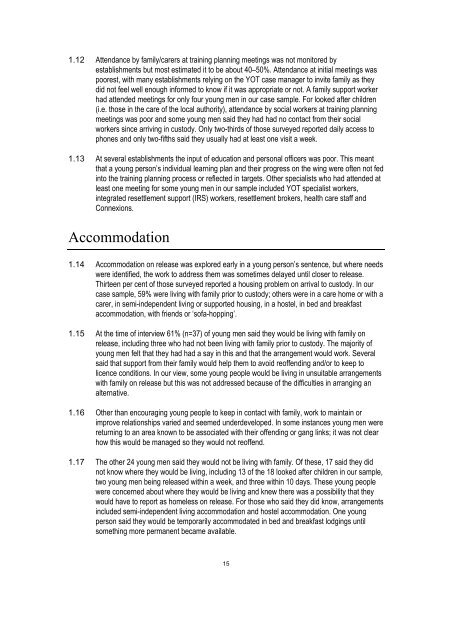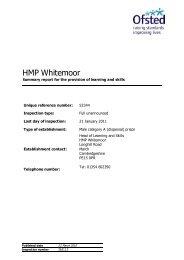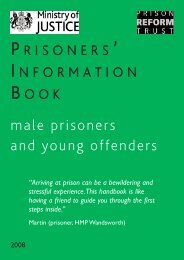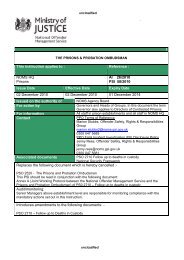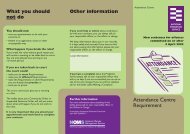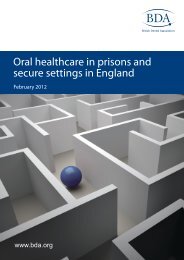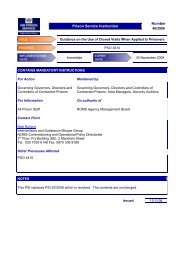Resettlement provision for children and young ... - Ministry of Justice
Resettlement provision for children and young ... - Ministry of Justice
Resettlement provision for children and young ... - Ministry of Justice
You also want an ePaper? Increase the reach of your titles
YUMPU automatically turns print PDFs into web optimized ePapers that Google loves.
1.12 Attendance by family/carers at training planning meetings was not monitored by<br />
establishments but most estimated it to be about 40–50%. Attendance at initial meetings was<br />
poorest, with many establishments relying on the YOT case manager to invite family as they<br />
did not feel well enough in<strong>for</strong>med to know if it was appropriate or not. A family support worker<br />
had attended meetings <strong>for</strong> only four <strong>young</strong> men in our case sample. For looked after <strong>children</strong><br />
(i.e. those in the care <strong>of</strong> the local authority), attendance by social workers at training planning<br />
meetings was poor <strong>and</strong> some <strong>young</strong> men said they had had no contact from their social<br />
workers since arriving in custody. Only two-thirds <strong>of</strong> those surveyed reported daily access to<br />
phones <strong>and</strong> only two-fifths said they usually had at least one visit a week.<br />
1.13 At several establishments the input <strong>of</strong> education <strong>and</strong> personal <strong>of</strong>ficers was poor. This meant<br />
that a <strong>young</strong> person’s individual learning plan <strong>and</strong> their progress on the wing were <strong>of</strong>ten not fed<br />
into the training planning process or reflected in targets. Other specialists who had attended at<br />
least one meeting <strong>for</strong> some <strong>young</strong> men in our sample included YOT specialist workers,<br />
integrated resettlement support (IRS) workers, resettlement brokers, health care staff <strong>and</strong><br />
Connexions.<br />
Accommodation<br />
1.14 Accommodation on release was explored early in a <strong>young</strong> person’s sentence, but where needs<br />
were identified, the work to address them was sometimes delayed until closer to release.<br />
Thirteen per cent <strong>of</strong> those surveyed reported a housing problem on arrival to custody. In our<br />
case sample, 59% were living with family prior to custody; others were in a care home or with a<br />
carer, in semi-independent living or supported housing, in a hostel, in bed <strong>and</strong> breakfast<br />
accommodation, with friends or ‘s<strong>of</strong>a-hopping’.<br />
1.15 At the time <strong>of</strong> interview 61% (n=37) <strong>of</strong> <strong>young</strong> men said they would be living with family on<br />
release, including three who had not been living with family prior to custody. The majority <strong>of</strong><br />
<strong>young</strong> men felt that they had had a say in this <strong>and</strong> that the arrangement would work. Several<br />
said that support from their family would help them to avoid re<strong>of</strong>fending <strong>and</strong>/or to keep to<br />
licence conditions. In our view, some <strong>young</strong> people would be living in unsuitable arrangements<br />
with family on release but this was not addressed because <strong>of</strong> the difficulties in arranging an<br />
alternative.<br />
1.16 Other than encouraging <strong>young</strong> people to keep in contact with family, work to maintain or<br />
improve relationships varied <strong>and</strong> seemed underdeveloped. In some instances <strong>young</strong> men were<br />
returning to an area known to be associated with their <strong>of</strong>fending or gang links; it was not clear<br />
how this would be managed so they would not re<strong>of</strong>fend.<br />
1.17 The other 24 <strong>young</strong> men said they would not be living with family. Of these, 17 said they did<br />
not know where they would be living, including 13 <strong>of</strong> the 18 looked after <strong>children</strong> in our sample,<br />
two <strong>young</strong> men being released within a week, <strong>and</strong> three within 10 days. These <strong>young</strong> people<br />
were concerned about where they would be living <strong>and</strong> knew there was a possibility that they<br />
would have to report as homeless on release. For those who said they did know, arrangements<br />
included semi-independent living accommodation <strong>and</strong> hostel accommodation. One <strong>young</strong><br />
person said they would be temporarily accommodated in bed <strong>and</strong> breakfast lodgings until<br />
something more permanent became available.<br />
15


